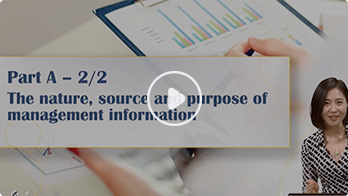这是一篇诚意满满的ACCA考试科目F1考试重点归纳及易错点分享,花10分钟看完它,考试多得10分也不是没可能。如果看完之后你觉得没什么卵用,那恭喜你同学,你在学霸的路上又晋级了。So,正文如下:
重点概念归纳
Mendelow:
Mendelow’s Matrix:Stakeholders&Power VS Interest
Hight power&high interest:key players
Hight power&low interest:keep satisfied
Low power&high interest:keep informed
Low power&low interest:minimal efforts
Anthony:
Planning Level:Hierarchy层级(管理层)——STO
战略(Strategic)规划(高级管理层:处理长期规划;关心公司发展方向、政策制定、危机处理)
战术(Tactical)决策(中层领导:每年具体目标制定;关心如何达到企业目标的方法、资源的合理配置、创新)
经营(Operational)管理(车间小组长:监管并参与实际生产;制定日常活动计划)
Porter:
价值链value chain
支持活动:基础设施、IT、HR、采购、财务
主要活动:进料inbound(receiving、warehousing、distribution)、加工(transforming)、给到客户(warehousing/distribution of finished goods)、市场/销售、售后服务
五力竞争模型Five competence force:
Threat of new entrants新兴商品(进入市场的障碍:economices of scale规模经济、product differentiation产品区别化、good brand name&customer loyalty品牌与客户忠诚度、capital requirement资金要求、switching cost转化成本、access to distribution channels分销渠道、learning cureve advantage学习曲线优势)/substitute替代品的威胁力、customers客户/suppliers供应商的议价能力、competitive rivalry同行业的竞争力
Generic Strategies:
Cost leadership成本领先:低成本生产商
Differentiation差异领先:unique独一无二
Focus:cost focus只注重部分市场;分类:成本中心/differentiation focus差异中心
Schein:
Determinanta of organization culture组织文化的决定因素:
组织文化的决定性因素(三个层级)P160
第一层级:Artifacts——可看得见的部分,包括工作行为、态度
第二层级:Values&Beliefs——潜在隐藏部分,包括目标、战略
第三层级:Assumptions——很难感受到,包括想法、感受
Handy:
Organization culture组织文化的分类:
组织文化的分类:权力型、角色型、任务型、个性型P162
权力型Power culture:保持绝对管理权;适用于简单/企业家结构组织——Zeus
角色型Role culture:按职位划分,变化/晋升缓慢;适用于官僚主义组织;适用于稳定、结构大的组织如政府机关——Apollo
任务型Task culture:注重任务完成结果的好坏、完成任务;适用于项目团队如matrix structure(短期、一次性),根据结果——Athena
个性型Person culture:满足某一个体的要求;适用于——Dionysus
Hofstede:
International culture国际文化五大差异维度:
权力距离power distance:上下级之间的关系(中方比较大,西方比较小)
个人主义&集体主义individualism&collectivism:中国崇尚集体、西方注重个人
男性化&女性化社会*masculinity&femininity:男性与女性之间的区别
低不确定性&高不确定性规避:uncertainty avoidance
短期取向&长期取向:Long&short term orientation
Leader VS Manager区别:Kotter&Bennis
Kotter:
管理Mngt应对复杂(Complexity—process&structure、analysis&control)情况,领导Leadership应付变化(change)
Bennis:
管理Mngt注重内控系统(system)和短期short term,领导注重人们(people)和长期long term
管理学代表人物及理论内容:
Scientific/classical theory of management科学管理——Fayol,Taylor
The human relations school人际关系学说——Mayo
Functions of a manager管理者的职能——Mintzber Drucker
Fayol:
管理五大职能:five functions of management—POCCC
Planning(determine objectives、strategies、policies、programmes&procedures for achieving the objective、the org&sub-units确定发展目标、策略、流程等)
Organizing(establish structure of task、delegate authority to carry out tasks、providing systems of inf.&communication for co-ordination of activities建立组织结构、下放权力)
Commanding(giving instructions下达命令)
Coordinating(harmonizing the goals and activities of individuals and groups within the organization个人目标与组织目标相统一)
Controlling(measuring&correcting评估和纠正)
后人/现代管理学增加两点:Motivating(激励)、Communicating(沟通)
Taylor:
科学管理:现代科学管理之父、科学管理的原理(4个)和方法(4个)、计件工资piecework Principles科学管理的原理:
The development of true science of work发展真正的科学(收集所有知识并明细化分)The scientific selection&progressive development of workers科学挑选员工并培训(提供最合适的工作)
The applications of techniques to plan制定科学的工作方法(评估并控制工作、为了最大产能)
The constant&intimate co-operation员工和管理层的合作
Techniques科学管理的方法:
Work study techniques研究工作方法(分析任务、找出最有效的方法、不准出错)Planning&doing were separated规划人和实施者分离
Jobs were micro-designed工作分解详细(简单、单一的任务)
Workers were paid incentives员工薪水(激励作用)
Mayo
Human Relation School人际关系学说:注重social relationships
Hawthorne实验(宣泄效应、发泄不满、与领导层沟通交流—心情变得舒畅也感觉到了管理层的关心、生产效率提高)
Marslow,Hertzberg
后人际关系学说(Neo-human relations)
——an open,dynamic organism with human psychological needs of growth,challenge,responsibility and fulfillment岗位中强调成长、责任感、成就感也能带来绩效的上升
Peter Drucker
Management Process管理过程:
注重management concepts and practices、a manager or a business has one basic function economic performance;管理过程的步骤(5步)
管理过程的步骤:为组织设立目标、为目标工作、激励员工、工作评估衡量、培训员工
Drucker认为:企业管理最重要的责任(overriding responsibility):经济效益(economic performance)
Mintzberg
Manager roles管理者的角色(3大角色、10小角色)
3大角色:interpersonal人际关系角色、informational信息角色、decisional决策角色
10小角色:3、3、4
人际关系:figurehead首脑、leader领导者、liaison person联络人
信息角色:监管者monitor、发言人spokesman、信息传播者disseminator
决策角色:企业家entrepreneur、资源分配管理recourse allocation administrator、商议者negotiator、传递者(解决问题者)mediator
观点:管理者不能总是作为计划者、管理者工作乱且不连续、管理者每天有职责要履行等
Leadership领导能力理论三大学派:Trait、Style、Contingent
Trait:Certain characteristics common to successful leader
Style学派代表人物:Ashridge—MGM分类、Blake&Mouton—MGM Grid
Contingent学派代表人物:Fiedler—PDMs&PCMs,Adair—ACL
Helfetz的Dispersed Leadership观点
Style:代表人物(Ashridge—MGM分类、Blake and Mouton—MGM Grid)
Ashridge:
Management College Model领导分类4类
Tells(autocratic):领导做所有决策、按照交代的做——专制
Sells(persuasive):领导做所有决策、但员工需被激励
Consults(咨询):领导考虑下级的观点、最后还是领导决策
Joins(democratic):领导和下级一起做决策、consensus达成一致
Blake and Mouton:
Management Grid方格理论(关心工作、关心员工)、*5个特殊点
1.1 Impoverished:双low型:对工作、员工都不关心
9.9 Team:双high型:
5.5 Middle Road(dampened pendulum):对工作、员工平衡关心
1.9 Country Club:对员工关心、不关心工作
9.1 Task management:对工作关心、对员工不关心
Contingency:根据变量而变化、*代表人物(Fiedler—PDM&PCM,Adair—ACL)
Fiedler:
Nature of leadership研究领导力的本质——部分因为态度attitude,部分取决于环境situation
领导的分类:PDMs(和下级保持距离、注重工作)、PCMs(和下级亲近、关系好)
影响领导有效的因素:上下级之间的关系、工作任务的结构清晰度、领导拥有的权利如何高效
领导的情形:员工敬爱爱戴领导、任务结构清晰、领导权利至高
Fiedler建议:PDM(structured)无论情形好坏都OK、PCM只有在favourable的时候才OK
John Adair:
行为中心领导(ACL)模型(建立在情况或功能之上、注重领导做了什么)
三个变量:任务需求、组员个人需求、小组需求
Effective leadership is a process of identifying and acting on that priority,exercising a relevant cluster of roles to meet the various needs.(有效领导需考虑以上三个变量)
任务需求:initiating、information-seeking、diagnosing、opinion-seeking、evaluating、decision-making(发起、信息寻找、诊断、意见寻找、评估、做决定)
组员个人需求:goal-setting、feedback、recognition、counselling、training(建立目标、反馈、意识、讨论、培训)
小组需求:encouraging、peace-keeping、clarifying、standard-seeking(鼓励、保持和睦、清晰化、标准寻找)
步骤:定义任务、计划、概述、控制、评估、激励、组织、建立模版
Heifetz:
Dispersed Leadership(组织中的任何一个人都可以发挥领导力和影响力
管理者在团队建立和队员个人发展的作用:P352
Belbin团队角色理论、Tuckman团队发展理论
Belbin
Team role theory团队角色理论:9大角色
*Plant:创造力creative、想象力imaginative、非正统unorthodox——解决难题——忽视细节,太全神贯注于高效的沟通
*Resource investigator:外向extrovert、热情enthusiastic、善于沟通communicative——寻求发展机会、发展/加强联系——太过乐观、三分钟热度过去就失去兴趣
*Co-ordinator(Chairman):成熟mature、自信confident、好领导a chair person——阐明目标、提升决策、好授权(管理层)——操纵、代表个人工作
*Shaper:挑战challenging、动感dynamic、抗压力strive on pressure——有推动力和勇气克服障碍——激怒/挑衅他人、伤害感情
*Monitor/Evaluator:冷静、战略型strategic、判断力强discerning——评估所有选择、准确评判accurate judgement——缺乏鼓舞他们的内驱力和能力,太过批判性
*Team Worker:合作cooperative、温和、感知力强、老练——聆听、建立、防止摩擦、平息风波calm waters——在关键情况下犹豫不决、容易被影响
Implementer(company worker):遵守记录、依赖性、保守、高效—把理想转换为现实——顽固的、对新的可能性反应迟钝
Completer/finisher:勤勉、认真、焦虑——查处错误和纰漏,准时交付——过度担心、不远委任、吹毛求疵
Specialist:专心single-minded、自启式self-starting、专注dedicated——提供少见的知识和技能——只对狭隘的前线有贡献、停留在学术性、忽略更大的蓝图
Tuckman
Team development process团队发展理论:分4个阶段FSNP P355
Forming:组建期、initial stage初期、introducing new ideas引进信理念、trying to find out each other相互认识和了解
Storming:动荡期、growing stage成长阶段、openning conflict unavoided不可避免的明显冲突、加强相互信任
Norming:规范期、mature成熟期、norms®ulations建立规范和规章制度
Performing:执行任务
后来的补充:
Dorming:步入正轨后的骄傲自满,导致退步
Mourning/adjourning:衰退/休整期:group breaks up、回到forming stage
*激励理论分类:内容理论、过程理论P366
内容理论:What motivates people?提供满足自己需求的方法
Maslow
Hierarchy of needs需求层次理论:五个层次P367
Physical生理需求:食物、住所
Saftety安全需求:安全、有秩序、可预测性、免受威胁
Love/Social爱/社会需求:关系、感情、归属感
Esteem尊重需求:独立、认可、地位、他人的尊敬
Self-actualisation自我实现:实现个人的潜力
只有当一个层次得到满足,才会有对下一层次的需求。
Maslow理论的局限性:P368
一个时期内的几个需求同时存在、不同需求不同人有不同的反应、需求递延(Deferred needs、suffer)、层级的实证检验很难、层级反映美国和英国的文化价值,也许不适用于其他国家
Hertzberg
Two-factor theory双因理论P368
理论基础:两个需求——Hygiene factors&Motivator factors保健因素&激励因素避免不愉快的需求:保健因素:预防员工的不满(公司政策和治理、工资、监督的质量、人际关系、管理风格、工作环境、工作保障、身份地位)
个人成长与实现的需求:动力因素(状态、提升、同事和管理者的认可、职责、挑战性工作、成就感、培训、工作中的成长与发展、身份地位)
Herzberg建议三种工作设计用来提升工作满意度:扩大就业job enlargement、工作轮换job rotation、工作丰富化job enrichment
Herzberg理论的局
限性:动力因素提升生产率很难衡量、样本的量不充足、限制性的文化背景(西方)P369、工作满足感对工作表现的影响无必然关系
过程理论:How can people be motivated?如何激励员工P369
Vroom
Expectancy theory期望理论:对结果的期待;激励可以被评估和估量
公式:F=V*E
F:motivation force
V:valence(preference)效价;由正数desired、负数avoid、零indifference表示
E:expectancy;0表示没有机会-1表示肯定之间的任何数字
Valence:正/负/零、达到目标后对个人的意义、目标的价值
Expectancy:自我评估实现目标的概率有多少
McGregor:
X理论和Y理论——两个极端假设P370
X理论:大多数人懒惰、不喜欢工作dislike、需要control——人之初、性本恶因此大多数人是被强迫、控制、指挥甚至胁迫的——管理者软硬兼施
Y理论:大多数人勤劳、喜欢工作not dislike——人之初、性本善
管理者应善于咨询并促进,使用正反馈、挑战、职责作为激励因素
Hertzberg:
三个方法、提高岗位设计、使工作对员工来说更有趣
Job enrichment:丰富化、扩大岗位职责、工作宽度、提高工作挑战性(vertical)
Eg:给员工足够的自由,考虑如何完成任务;鼓励员工参与规划决策;定期给员工反馈
Job enlargement:扩大化、增加工作的环节和步骤(horizontal)
Job rotation:轮换制、员工岗位轮换
Honey&Mumford
学习风格4种P383 TRAP
Theorists理论主义者:understand basic principles—清晰计划且有结构、分析、喜欢老师和他们沟通理论和分析
Reflectors反射主义者:work at his own pace(自学)、总结结论、速度慢、不参与课堂学习
Activists积极者:处理practical/active problem、不爱理论—喜欢学习工作经验、乐于参加、接受压力、比较激进
Pragmatists实用主义者:只学习解决目前实际有关问题的方法、善于通过在职训练学习新技术、目的性强
Kolb:
Learning Cycle学习流程——学习周期P384
又称:Experimental Learning Cycle、learner in an active problem-solving role、self-learning、学习周期:
Having an experience(Act)
Observation&Reflection(Analyse Action)
Formation&Abstract/Concepts&Generalization(Suggest Principles/Abstract)
Applying&Testing(Apply Principles/Plan)
易错点分享
1.Public sector&Private sector
Public sector is the organization owned or run by the government or government agencies.
All the other organizations are classified as the private sector.
2.Public company&Private company
Private company is usually owned by a small number of people and these shares are not easily transferable.
Shares of public company will usually be traded on a Stock Exchange.
3.Geographic departmentation
Where the organization is structured according to geographic area,some authority is retained at Head Office but day-to-day operations are handled on a territorial basis.
So it is centralized.
4.Divisionalisation
It is the division of a business into autonomous regions of product business,each with its own revenues,expenditure and capital asset purchase programs,and therefore each with its own profit and loss responsibility.
So it is decentralized.
5.Internal control
An internal control is any action taken by management to enhance the likelihood that established objectivity and goals will be achieved.Management plans,organizes and directs the performance of sufficient actions to provide reasonable assurance that objectives and goals will be achieved.
6.Internal check
An internal check is defined as the checks on the day-to-day transactions whereby the work of one person is proved independently or is complementary to the work of another,the object being the prevention or early detection of errors and fraud.
7.Connected&external stakeholders
Connected and internal stakeholders are primary and the external stakeholders are secondary.There are agreements or contracts between the primary stakeholders and the organizations.The secondary stakeholders have indirect influence on the companies.
8.Stagflation
It occurs where there is a combination of high unemployment and high inflation caused by a price shock and inflexibility in supply.
So CPI and unemployment rate is increasing.But the GDP is not growing.
9.Leadership&management
Leadership is the process of influencing others to work willingly towards goals,to the best of their capabilities,perhaps in a manner different to that which they would otherwise have chosen.
Management is the process of getting actives completed efficiently and effectively,with and through other people.
10.Effectiveness&Efficiency
Effectiveness means whether the results are complied with the goals or purposes.So it is about“what to do”.
Efficiency means the low wastage or loss to produce the maximum output.It is about“how to do”.ACCA题库,戳:ACCA题库【手机可刷+全球题库】(按照知识点进行分类配题,有知识点没有搞懂,无法解锁,直至掌握,目前阶段免费)




 考经分享
考经分享
 发布时间:2018-05-09
发布时间:2018-05-09 

 复制本文链接
复制本文链接 模拟题库
模拟题库

 194
194



















